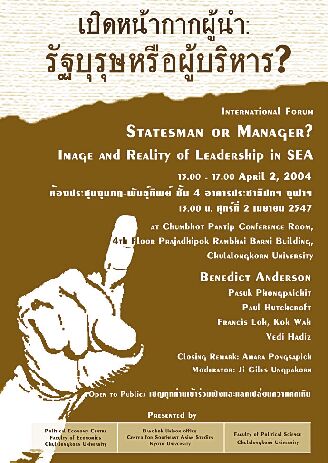過去のセミナー案内:16年度
2004年4月
- Special Seminars of CSEAS visiting research fellows
-
- 日 時:2004年4月20日(火) 14:00〜17:10
- 場 所:京都大学東南アジア研究所・東棟E207
- Seminar 1:14:00-15:30
- 話 題:"A CASE FOR MANGROVE FOREST REHABILITATION"
- 講 師: Dr. Pipat Patanaponpaiboon, CSEAS Visiting Research Fellow
- 要 旨:
Mangrove forests are occupied by a unique group of trees or shrubs growing
on the intertidal zones of tropical and subtropical estuaries, creeks where
the salt water reaches. Furthermore, as mangrove forests settle in the
estuaries where abundant sediments accumulate through upstream flows and
daily tides, they act as a nursery for juvenile aquatic animals. This diversity
of animals and the unique vegetation type gives mangrove forests the potential
for ecological tourism, further merit for their conservation. Therefore,
the mangrove forests are recognized as a valuable ecological and economic
resource. In the last few decades, mangrove forests in Southeast Asia have
been exploited by charcoal and timber production, tin mining, coastal industrialization
and urbanization, and coastal aquaculture like shrimp farming, which has
a significant impact on the decreasing forests.
Mangrove rehabilitation or restoration is an effective option that has
been initiated successfully in various destroyed areas of mangrove forest.
However, it is remarkable that the rehabilitation of mangrove forest is
not easy. Previous rehabilitation was mostly carried out by trial-and-error,
and the available information on rehabilitation is mostly available for
Rhizophora. Failed mangrove forest rehabilitation is probably due to inadequate
site assessment or an improper species of mangrove seedlings being planted
in the defined area. The soil elevation and flooding regime should be also
taken into consideration. Although mangrove rehabilitation appears to be
possible, restoring the complexity of animals and microbial components
is still questionable.
To deal with the problem of mangrove forest degradation, increasing public
awareness of the true value of this forest is recommended. At the same
time, the success of the mangrove rehabilitation depends upon closer cooperation
by local communities. It is suggested that an optimal-wide green belt of
mangrove forest along the shorelines should normally be present in a good
condition. The area behind the green belt can be provided for traditional
utilization in a sustainable and environment-friendly manner.
- Coffee Break:15:30-15:40
- Seminar 2:15:40-17:10
- 話 題:"Sustainable Tropical Forest Management: Myanmar Perspectives"
- 講 師:Dr. Aung Than, CSEAS Visiting Research Fellow
- 要 旨:
The Bountiful and Successful Past
The successive development of scientific tropical forest management in
Myanmar in the past 150 years since its birth in 1856 has been recognized
by many and authoritatively by the FAO, in its January 2004 report 'The
State of the World's Forests 2003', the near perfect Myanmar Selection
System (MSS) as successful in managing the country's vast forest resources
on sustainable basis. Today, 52% of the country land area (353,000 km2)
is still covered with protective and roductive tropical forests. The per
capita forest area of Myanmar, 0.8 ha, is moderate compared to the Asian
average of 0.2 ha and Southeast Asian average of 0.5 ha. The nation's foreign
exchange earnings have been topped by the forestry sector for the last
two decades with the peak of as high as 43% of the nation's total in 1986-87.
The internal consumption needs of timber and other forest products of the
people including the subsistence needs of the forest dwellers also have
mostly been met in the past.
The Ugly and Difficult Present
The FAO, despite its optimism, is very concern of the deforestation rate
of Myanmar, which is alarming at 1.4% as indicated by satellite imagery
data on Myanmar forest cover for the last decade of 1990 -2000. It is significantly
high compared to the Asia's average of 0.05% and the world's average of
0.24% and is increasing compared to earlier estimates.
The main culprit of deforestation in Myanmar is truly observed as illegal
logging and over-logging together with the usual agricultural expansion
and shifting cultivation. The situation is rightfully put as the result
of complex political and socio-economic implication during the socialist
era and most significantly during the past two decades.
Despite the difficulties even to look seriously into the true situation
of the tropical forest management dilemma of Myanmar, it must be solved
by hook or by crook if the valuable tropical forests of South-east Asia
are to be preserved on sustainable basis for the sake of not only Myanmar
and her people but also for the people of the region. But How?
Agriculture and Forestry
Agriculture and forestry are in the same fate facing the same dilemma if
it comes to the concern of food security and survival of the people. And
the solution to the forestry problems could only be found outside of the
forests rather than inside. In view of this wisdom, forestry and agriculture
must work together towards the sustainable future.
- 連絡先:山田勇(京都大学東南アジア研究所)
- 東南アジアの自然と農業研究会・第115回定例研究会
- 第 115回定例研究会を開催いたします。
今回は、神戸学院大学大学院 人間文化学研究科の辻 貴志 氏 氏に下記の内容で報告していただきます。
ぜひご来聴ください。
なお研究会終了後、懇親会を予定しておりますので、こちらにも奮ってご参加ください。
-
- 日 時:2004年4月16日(金) 16:00〜18:00
- 場 所:京都大学東南アジア研究所・東棟E207
- 話題提供者:辻 貴志 氏(神戸学院大学大学院 人間文化学研究科)
- 話 題: 「共生の戦略−フィリピン・パラワン島南部における先住少数民族モルボッグ族の沿岸域での自然利用とその意義」
- 要 旨:
フィリピンのパラワン島は、「最後の開拓地(ラスト・フロンティア)」として、急激な移民の流入や木材伐採、鉱物採掘、水産資源の乱獲といった天然資源の収奪や開発の波にさらされてきた。しかし、こうした外的圧力は島の自然環境を減退させただけにとどまらず、元来それに依存して生活してきた先住少数民族たちの土地や生業の場をも脅かし、かれらの社会構造や価値観も大きく揺さぶられつつある。
本報告では、パラワン島の先住少数民族たちのうち、島南部のイスラム教徒であるモルボッグ族を対象として議論をおこなう。かれらは焼畑農耕を主な生業にするが、沿岸域での自然利用、とりわけ漁撈活動にも積極的に従事している。その漁撈活動と産物が、焼畑の生産性が低下する中、かれらの生計維持だけでなく、市場での現金収入の獲得や他民族との民族間関係の構築においても重要な位置を占めていることを報告したい。
しかし、ダイナマイト漁などによる違法漁業や沿岸開発の影響により、沿岸域での自然利用の将来もまた危惧されつつある。このような現状の中、どのようにしてかれらが自分たちの民族的ニッチェを模索し危機に対応しつつあるのか考察してみたい。
- 問い合わせ先:
星川圭介 総合地球環境学研究所
田中耕司 京都大学東南アジア研究センター
- WEB SITE: http://www.cseas.kyoto-u.ac.jp/seana/
- International Forum on Statesman or Manager? Image and Reality of Leadership
in SEA
- in cooperation with CSEAS, Bangkok Liaison Office and the Political Economy
Centre and Faculty of Political Science, Chulalongkorn University
-
- 日 時:2004年4月2日(金) 13:00〜17:00
- 場 所:Chumbhor Pantip Conference Room, 4th Floor Prajadhipuk Rambkai, Barni Buiildig,
Chulalongkorn University

-
▲ページトップ
|


